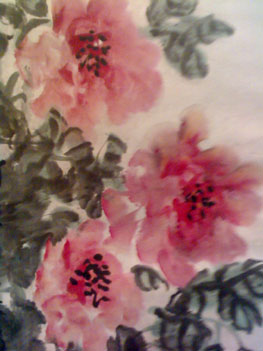|
Chinese Brush Painting
Chinese brush painting has developed over a period of more than 6000 years, since its start in about 4000 B.C. Originally, Chinese painting was closely related to other crafts, like pottery, bronze ware inscription and jade carving. The introduction of Buddhism to China from India during the first century A.D. and consequent temple building and grotto carving led to the development and prominence of religious murals and artwork. During the Song dynasty (960-1127), religious-themed paintings took the backseat to portraits. Paintings of historical characters and stories from everyday life became very popular By the 4th century, landscape painting established itself as an independent form of expression. It consisted of two separate styles: blue-and-green landscapes and ink-and-wash landscapes. The blue-and-green landscape utilized bright blue, green and red pigments derived from minerals to create a decorative style that sought to recreate landscapes accurately. The ink-and wash landscape relied on vivid brushwork and varying degrees of ink intensity to express the artist's conception of nature, and his own emotions and individuality. The 9th century saw the emergence of the “flower-and-bird painting” as an independent genre. Subject matter included a rich variety of flowers, fruits, insects and fish. Today, painters often mix several colors on one brush or mix their colors with black inks to obtain more natural and richly varied colors. Such techniques have been widely adopted and further developed in recent years.
 |
| Copyright © China.org.cn. All Rights Reserved 京ICP证 040089号 京公网安备110108006329号 网络传播视听节目许可证号:0105123 京公网安备110108006329号 京网文[2011]0252-085号 |

 0
0 







Go to Forum >>0 Comment(s)